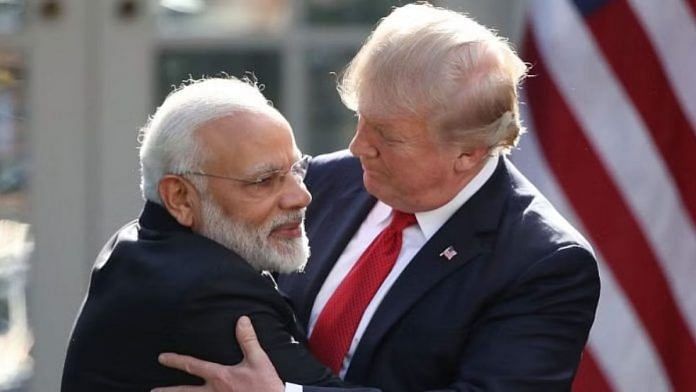I hope the US and India can pull off this announcement when Trump is in New Delhi next.
With a 1,25,000-strong crowd cheering him on, President Trump had once declared, “We are very, very proud of India. The story of the Indian nation is a tale of astounding progress, a miracle of democracy, extraordinary diversity, and above all, a strong and noble people.”
This was 24 February 2020. Trump, then in the final year of his first presidency, was addressing a ‘Namaste Trump’ rally alongside Indian Prime Minister Narendra Modi at Motera stadium in the Indian state of Gujarat.
Much water has flown down the Potomac since. But with a Trump administration back in the White House, its continued emphasis on the need to bolster business ties between India and the US remains consistent.
If both countries can create conditions conducive to Indian firms either setting up shop or expanding operations in the US, it would be a historic win-win situation, and an incredible opening for Indian businesses to benefit from the massive American economy.
It would also serve as a trust-building exercise, the likes of which have never been seen before, between the two nations.
Tata Group was among the first Indian conglomerates to establish a permanent presence in the US, in the 1940s.
Cut to 11 March 1999, when Bengaluru-headquartered Infosys became the first Indian company to be listed on Nasdaq. Speaking at a media conclave back in India in March last year, its founder Narayana Murthy described the gravity of that moment thus: “I think that was, in some sense, we were doing something that had not been done at all by an Indian company.”
According to the 7th edition of a survey conducted by the Confederation of Indian Industry (CII) Indian companies had by 2023 invested upwards of $40 billion in tangible investments in the US. Titled ‘Indian Roots, American Soil,’ the survey mapping Indian industry’s business footprint in the US also found that Indian firms were at the time employing at least 425,960 Americans—all of them direct hires.
It identified the following as the top five American states receiving the most Indian foreign direct investment (FDI): Texas, Georgia, New Jersey, New York and Massachusetts. Similarly, Texas, New York, New Jersey, Washington, Florida and California were identified as the top five American states where Indian companies created the most jobs.
The nationwide survey, for which CII collected responses from 163 Indian firms with permanent operations in the US, also found that 29 per cent of these firms were in the life sciences, pharmaceutical and healthcare sector, followed by 21 per cent in information technology and telecommunications, 18 per cent in manufacturing and 10 per cent in services.
Further, it found that 55 per cent of the 157 companies that responded to a particular section of the survey reported funding R&D in the US to the tune of nearly $1 billion. More importantly, 85 per cent of Indian firms surveyed said they planned to hire additional local employees in the US over the next five years, with 83 per cent planning future investments in the US.
For Indian firms, this has been a chance to expand and ensure their competitiveness, and to reimagine their corporate governance structures in line with the robust emphasis on shareholder rights, strong legal framework, and regulatory oversight that has over the past century nurtured the most prosperous free market in the world.
It would also enable large Indian businesses, many of which are still family-owned, to diversify and become global conglomerates.
As Robert Webb, then chief information officer of Hilton Worldwide predicted in a conversation with Paul Glader of The Washington Post in a 2011 article on how growth of Indian firms in the US was bringing outsourcing home, India-based firms “will evolve to be more like one of the traditional consulting firms in the US” by taking on higher-end capabilities, from business planning, industry knowledge and change management.
Besides the economic side of things, the approach requiring Indian firms to invest and hire in the US will allow working-class Americans to learn more about India, its culture and famed business mindset. This would further strengthen the foundation of US-India ties at this critical juncture.
Asha Jadeja is a Silicon Valley-based entrepreneur, venture capitalist, philanthropist and a ‘change agent’. She tweets @ashajadeja325. Views are personal.
This article is sponsored by the Motwani Jadeja Foundation.








